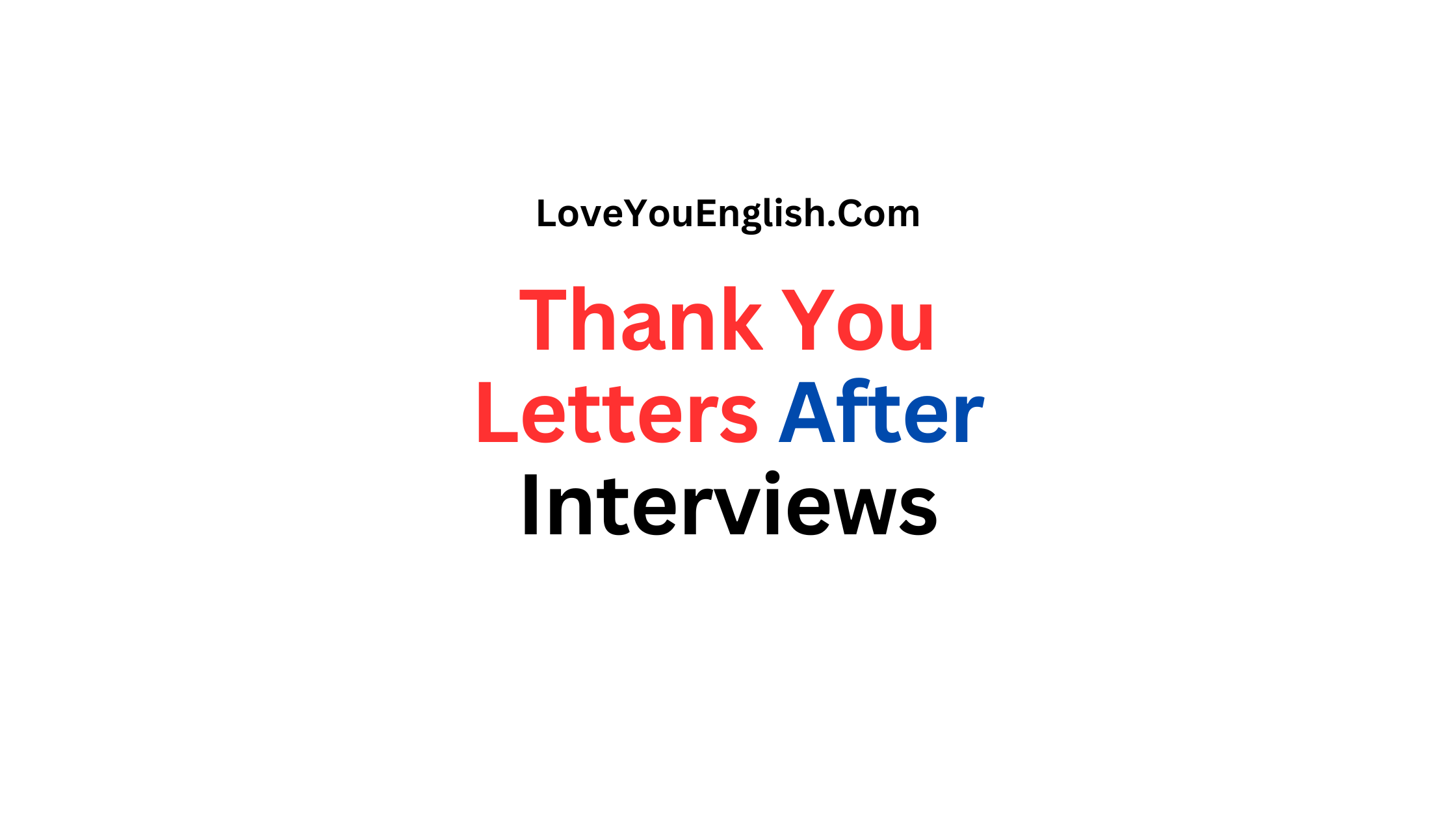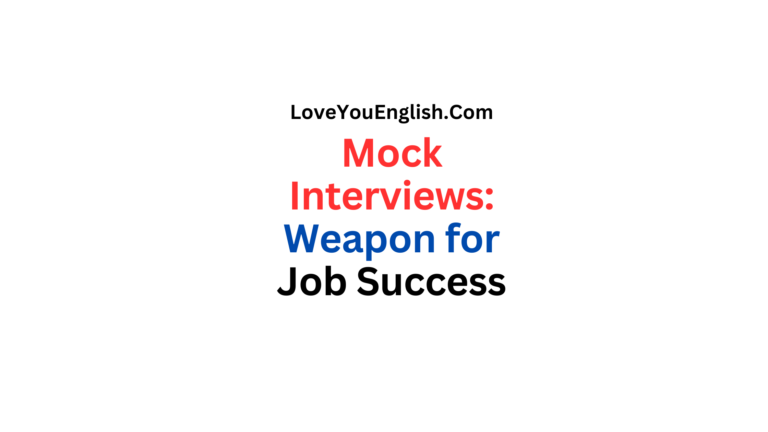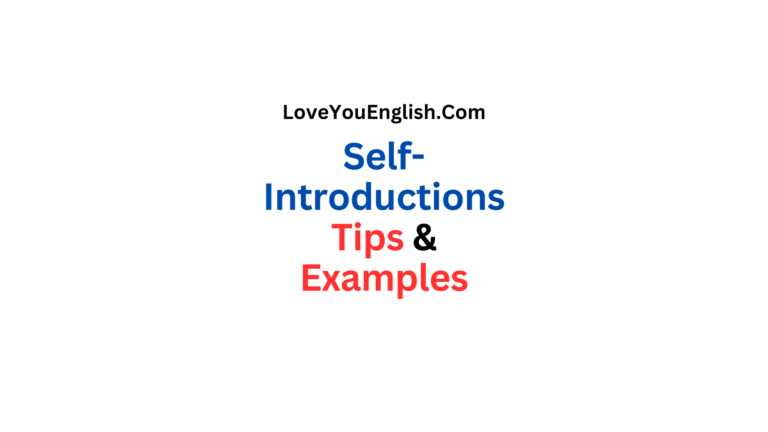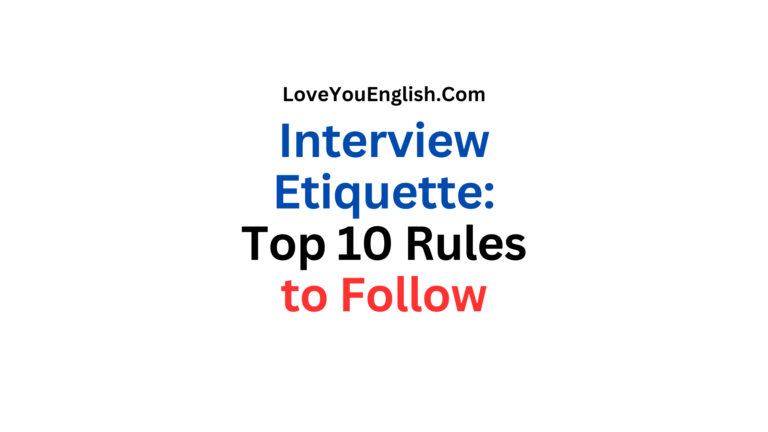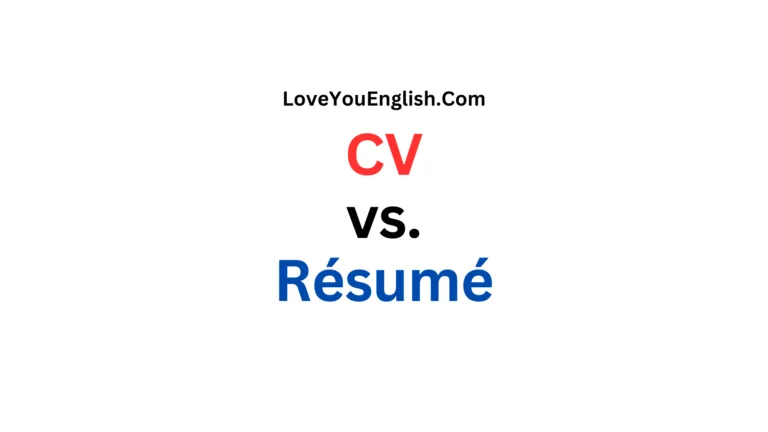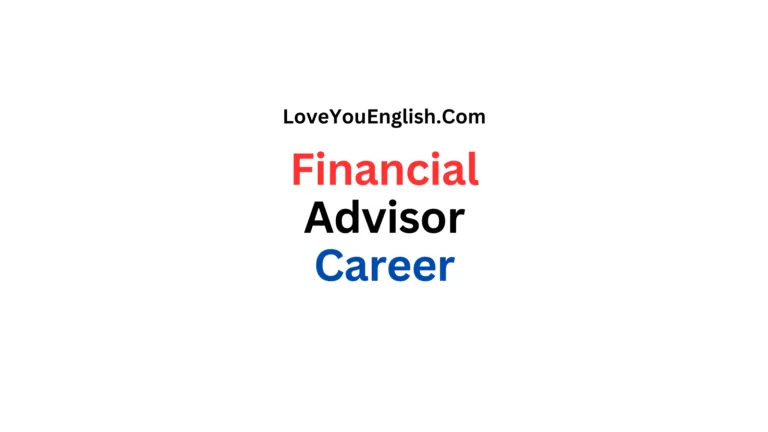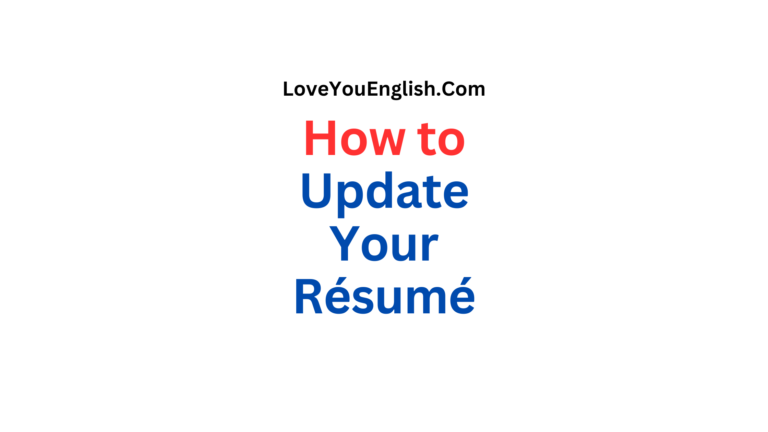Thank You Letters After Interviews: A Complete Guide
Thank You Letters After Interviews: A Complete Guide
Have you ever left a job interview feeling great, but then wondered what to do next?
One important step many job seekers forget is sending a thank you letter or email after the interview.
This simple act can make a big difference in your job search.
In this blog post, we’ll explore everything you need to know about post-interview thank you messages.
Why Send a Thank You Letter?
You might be thinking, “Do I really need to send a thank you letter? Isn’t that old-fashioned?”
The truth is, sending a thank you note after an interview is still very important.
Here’s why:
It shows good manners: Sending a thank you note is polite and professional. It shows that you appreciate the interviewer’s time and effort.
It keeps you in the interviewer’s mind: After meeting many candidates, interviewers can forget details. A thank you note reminds them of your conversation and keeps you fresh in their memory.
It gives you another chance to impress: You can use the thank you note to highlight your strengths and add anything you forgot to mention in the interview.
It shows your enthusiasm: A thank you note tells the employer that you’re really interested in the job. This can set you apart from other candidates who don’t send one.
It can fix any mistakes: If you feel you didn’t answer a question well in the interview, you can clarify or expand on your answer in the thank you note.
When to Send Your Thank You Letter
Timing is important when it comes to thank you letters. You don’t want to send it too soon and seem desperate, but you also don’t want to wait too long and miss the opportunity.
Here are some guidelines:
- Send your thank you note within 24 to 48 hours after the interview. This shows that you’re prompt and eager, but not overly anxious.
- If you had multiple interviews in one day, send a separate thank you note to each person you met with.
- If you interviewed on a Friday, it’s okay to send your thank you note on Monday. Most people don’t check work emails over the weekend anyway.
- If the hiring decision is going to be made very quickly (like the next day), send an email thank you as soon as possible after the interview.
Email vs. Handwritten Note
In the past, handwritten thank you notes were the norm.
Today, email is usually the best choice.
Here’s why:
- Speed: Emails arrive instantly, while postal mail can take days.
- Convenience: Most hiring managers prefer email communication.
- Formality: Unless you’re in a very traditional industry, an email is considered professional enough.
- Readability: Your handwriting might be hard to read, but typed text is always clear.
However, there are some cases where a handwritten note might be appropriate:
- If the company culture is very traditional or formal.
- If you know the hiring manager prefers old-school communication.
- If you want to stand out in a creative field (but make sure your handwriting is neat!).
When in doubt, go with email. It’s safe, fast, and widely accepted.
More interesting topics:
- 50 Ways to Start a Conversation with Anyone
- Top Interview Tips for International Remote Jobs
- Effective Strategies to Improve Your Communication Skills
- 20 Essential Soft Skills for Students
- How to Concentrate on Studies | 10 Useful Methods
What to Include in Your Thank You Letter
Now that you know why and when to send a thank you letter, let’s talk about what to include.
A good thank you letter should have these parts:
A clear subject line (for emails): Something like “Thank you for the interview” or “Following up on [Job Title] interview” works well.
A greeting: Address the interviewer by name. If you met with multiple people, send separate emails to each one.
An expression of thanks: Start by thanking the interviewer for their time and the opportunity to learn about the position.
Specific details about the interview: Mention something you discussed to jog their memory and show you were paying attention.
Reaffirmation of your interest: Express your enthusiasm for the role and the company.
A highlight of your qualifications: Briefly remind them why you’re a great fit for the job.
Any additional information: If you forgot to mention something important in the interview, you can include it here.
Next steps: Ask about the next steps in the hiring process if you didn’t get this information during the interview.
A final thank you: Close with another expression of gratitude.
Your full name and contact information: Make it easy for them to reach you if needed.
Sample Thank You Letter Template
Here’s a basic template you can use for your thank you letter:
Subject: Thank you for the [Job Title] interview
Dear [Interviewer’s Name],
Thank you for taking the time to meet with me yesterday about the [Job Title] position at [Company Name]. I enjoyed our conversation and learning more about the role and the company.
I was particularly interested in [specific topic you discussed]. Your insights into [another topic from the interview] were very helpful in understanding the challenges and opportunities of this position.
After our discussion, I’m even more excited about the possibility of joining your team. I believe my skills in [relevant skill] and my experience with [relevant experience] would allow me to make significant contributions to your projects.
I also wanted to mention [additional information or clarification, if needed].
Please let me know if you need any additional information from me. I’m looking forward to hearing about the next steps in the process.
Thank you again for your time and consideration.
Best regards, [Your Full Name] [Your Phone Number] [Your Email Address]
Tips for Writing an Effective Thank You Letter
Now that you have a basic template, here are some tips to make your thank you letter even more effective:
Personalize each letter: If you interviewed with multiple people, make each thank you note unique. Don’t just copy and paste the same message.
Be specific: Mention particular topics from your conversation. This shows you were paying attention and helps the interviewer remember you.
Keep it concise: Your thank you note should be short and to the point. Aim for about 200-300 words.
Proofread carefully: Typos or grammar mistakes in your thank you note can undo the good impression you made in the interview. Double-check everything before you send it.
Use a professional tone: Even if your interview was casual, keep your thank you note professional. Avoid slang or overly familiar language.
Show enthusiasm: Express your excitement about the role and the company, but don’t go overboard. You want to seem eager, not desperate.
Highlight your fit: Remind the interviewer why you’re the best person for the job, but keep it brief. This isn’t a second cover letter.
Add value: If possible, include something that adds value, like an article related to a topic you discussed or a relevant idea you had after the interview.
Follow their lead on formality: If the interviewer signed their emails with their first name, it’s okay for you to address them that way in your thank you note.
Use good email etiquette: If you’re sending an email, use a professional email address and a clear, concise subject line.
Common Mistakes to Avoid
Even with the best intentions, it’s easy to make mistakes when writing a thank you letter.
Here are some common pitfalls to avoid:
Waiting too long: Sending a thank you note weeks after the interview is almost worse than not sending one at all. It makes you seem disorganized or uninterested.
Being too casual: Even if the interview was relaxed, your thank you note should still be professional. Avoid jokes, emoticons, or overly familiar language.
Making it all about you: While it’s good to reiterate your qualifications, the main purpose of the note is to thank the interviewer. Don’t make it sound like a sales pitch.
Begging for the job: Expressing enthusiasm is good, but don’t beg or sound desperate. It can make the employer uncomfortable and question your professionalism.
Sending a generic note: A thank you note that could apply to any job interview is a missed opportunity. Make sure to include specific details from your conversation.
Overlooking errors: Spelling mistakes, grammar errors, or addressing the note to the wrong person can undo all the good work you did in the interview.
Including irrelevant information: Stick to information related to the job and the interview. This isn’t the time to share personal stories or unrelated achievements.
Being negative: If you felt the interview didn’t go well, don’t mention it in your thank you note. Stay positive and focus on your strengths.
Stalking the interviewer: Don’t try to connect with the interviewer on social media right after the interview. It can seem pushy and unprofessional.
Forgetting to actually say thank you: It might seem obvious, but make sure your note includes a clear expression of gratitude.
What If You Don’t Have the Interviewer’s Email?
Sometimes, you might leave an interview without getting the interviewer’s email address.
Don’t panic!
Here are some ways to handle this situation:
Check the business card: If the interviewer gave you their business card, their email should be on it.
Look on the company website: Many companies list employee email addresses on their website.
Check LinkedIn: The interviewer’s email might be listed on their LinkedIn profile.
Use an email finder tool: There are online tools that can help you find work email addresses if you have the person’s name and company.
Call the company: As a last resort, you can call the company’s main number and ask for the interviewer’s email address.
Send it to your contact person: If you’ve been communicating with a recruiter or HR person, you can send your thank you note to them and ask them to forward it to the interviewer.
Remember, it’s better to send a thank you note to a general company email or your HR contact than to not send one at all.
Following Up After the Thank You Note
After you’ve sent your thank you note, you might be wondering what to do next.
Here are some guidelines for following up:
Wait for their timeline: If the interviewer told you when they’d make a decision, wait until after that date to follow up.
Follow up after a week: If you weren’t given a timeline, it’s generally okay to follow up about a week after your thank you note.
Keep it brief: Your follow-up should be short and to the point. Ask if there’s any additional information you can provide and express your continued interest in the position.
Don’t pester: If you don’t hear back after your first follow-up, wait at least another week before trying again. Constant emails can annoy the hiring manager.
Know when to move on: If you’ve followed up two or three times with no response, it’s probably time to focus your energy on other job opportunities.
Thank You Notes for Different Situations
While the basic structure of a thank you note remains the same, you might need to adjust your approach for different interview situations:
Phone or video interviews: Even if you didn’t meet in person, it’s still important to send a thank you note. Mention something specific from the call to personalize it.
Group interviews: If you interviewed with a panel, try to send individual notes to each person. If you don’t have everyone’s contact information, it’s okay to send one note to your main contact and ask them to pass on your thanks to the others.
Multiple rounds of interviews: Send a thank you note after each round. Make each one unique by mentioning specific points from that particular conversation.
Informational interviews: Even though these aren’t for a specific job, it’s still polite to send a thank you note. Express your gratitude for their time and insights.
Job fairs: If you had a meaningful conversation with a recruiter at a job fair, follow up with a thank you note. This can help you stand out from the crowd.
The Impact of a Good Thank You Note
You might be wondering if all this effort is really worth it. Does a thank you note actually make a difference? The answer is yes!
Here’s how:
It can tip the scales: If the hiring decision is close between you and another candidate, a thoughtful thank you note could give you the edge.
It demonstrates your communication skills: Writing a clear, professional thank you note shows that you have good written communication skills, which are valuable in almost any job.
It shows you’re serious about the job: Taking the time to write a thank you note demonstrates your genuine interest in the position.
It leaves a lasting impression: A well-written thank you note can leave the interviewer with a positive final impression of you.
It can address any concerns: If you sensed any hesitation from the interviewer, you can use the thank you note to address those concerns directly.
Conclusion
Sending a thank you note after a job interview might seem like a small thing, but it can have a big impact on your job search.
It’s a simple way to show your professionalism, reinforce your interest in the position, and leave a positive final impression.
Remember, a good thank you note should be prompt, personalized, and professional. Take the time to craft a thoughtful message that references specific points from your interview and reiterates your enthusiasm for the role.
While there’s no guarantee that a thank you note will land you the job, it certainly can’t hurt your chances.
At worst, you’ve demonstrated good manners. At best, you’ve set yourself apart from other candidates and given yourself an edge in the hiring process.
So, the next time you leave a job interview, don’t forget this crucial step. Take a few minutes to send a sincere thank you note.
It could be the thing that makes the difference between hearing “We’ll keep your resume on file” and “When can you start?”

